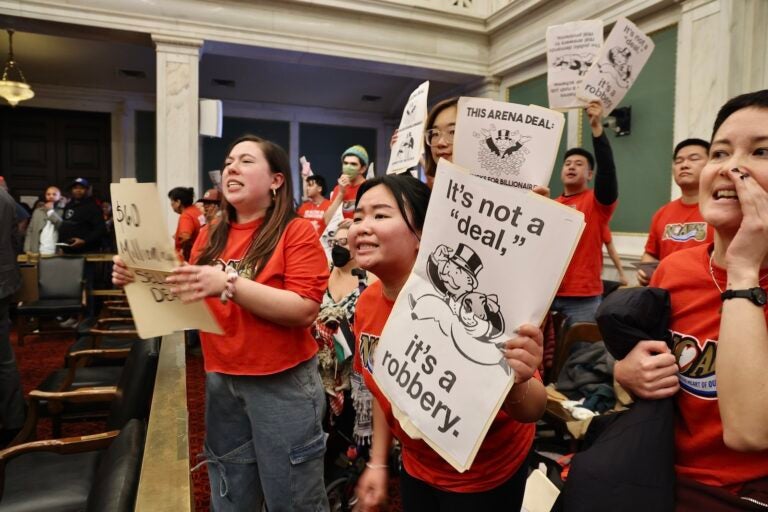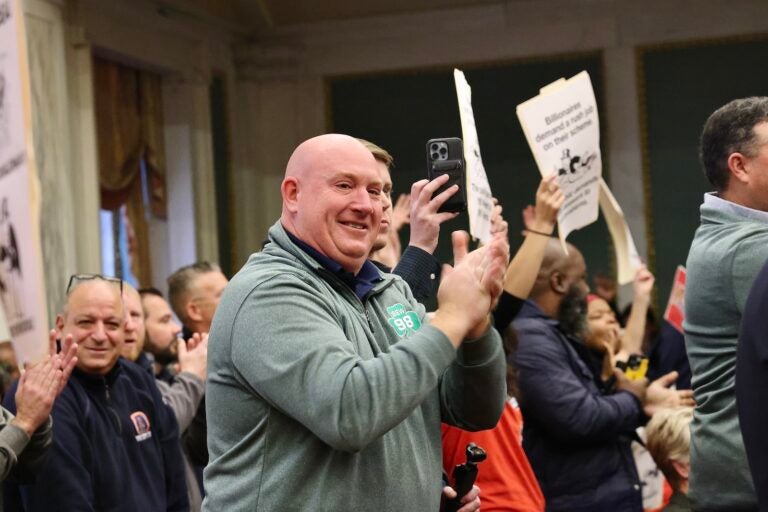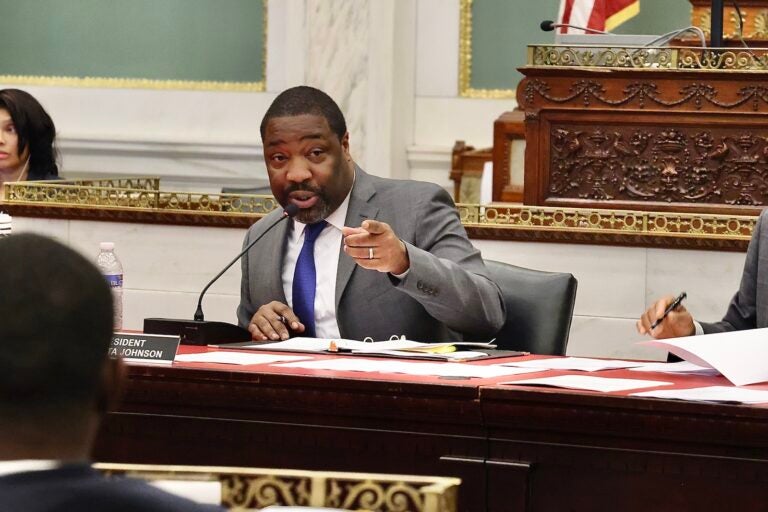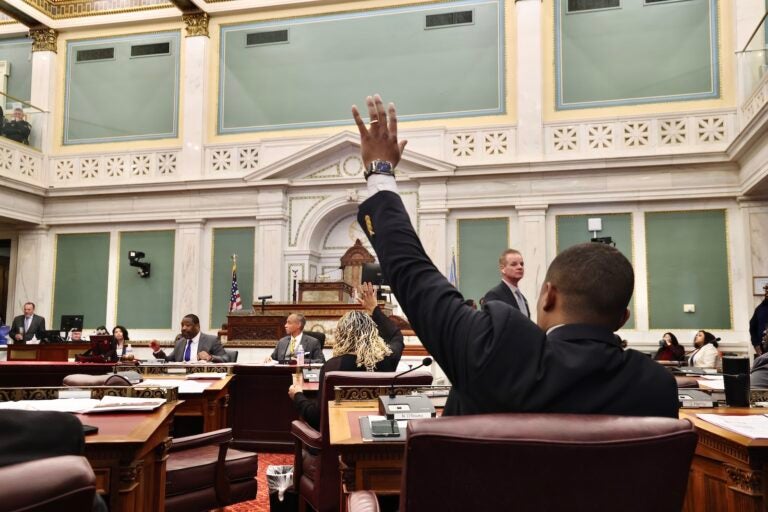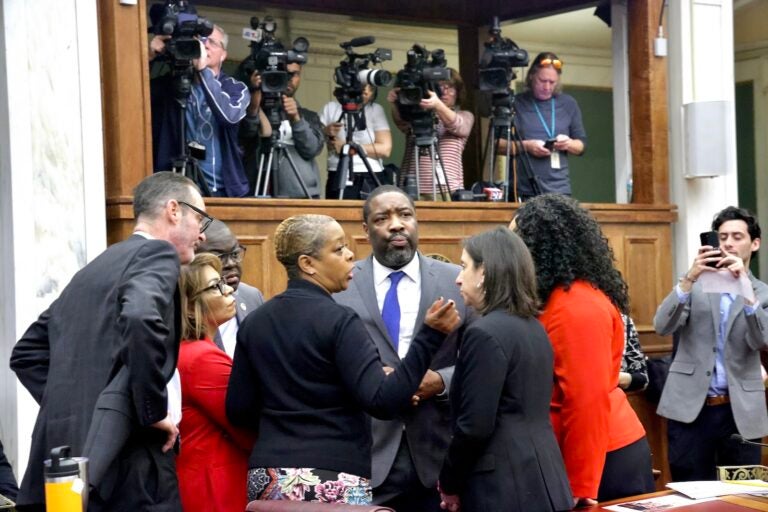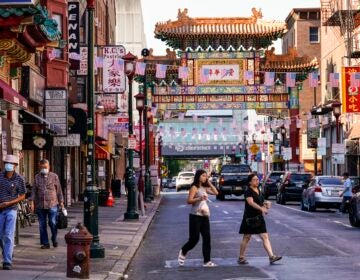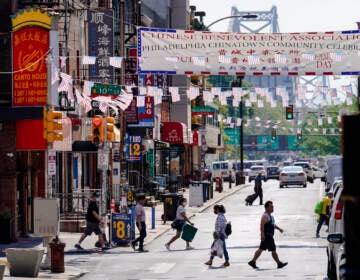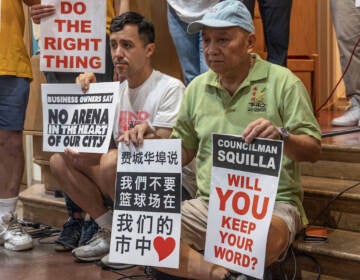With $60M community benefits agreement, Philly City Council gives initial approval for Sixers arena by a 12-4 vote
The full City Council body is expected to take a second and final vote on the bills on Dec. 19.
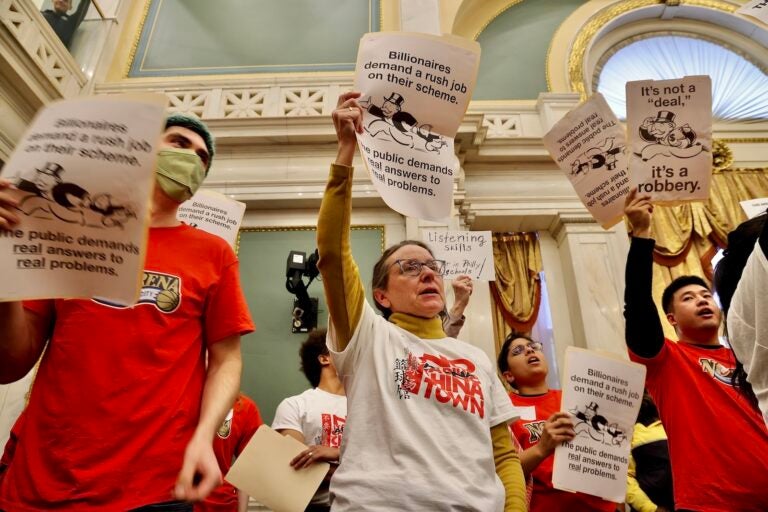
Sixers arena opponents chant as City Council weighs whether to approve a preliminary bill that would allow a new arena to be built on Market Street. (Emma Lee/WHYY)
What you need to know
- The 76ers have proposed moving to a new $1.55 billion arena near Chinatown called “76 Place”
- The proposal has drawn swift condemnation, excitement, skepticism — and plenty of buzz
- Black Clergy of Philadelphia has endorsed the project, while a majority of Chinatown businesses and other community members have voiced their opposition
- Philly Mayor Cherelle Parker formally announced her support for the arena
The Philadelphia 76ers are one step away from securing the approvals the team needs to build a new basketball arena in Center City, more than two years after it announced the $1.3 billion proposal.
Following hours of closed-door negotiations, City Council on Thursday voted 12-4 to move enabling legislation out of the Committee of the Whole, which comprises all 17 lawmakers. The full body is expected to take a second and final vote on the bills on Dec. 19, the last regular meeting before lawmakers break for winter recess.
While it is possible lawmakers will change their position, the outcome is not expected to change.
“We really worked hard with the administration and council to understand what the concerns were of members and the community. We tried to do the best we can to get something we could pass,” said Councilmember Mark Squilla, whose district includes the proposed arena site, after Thursday’s contentious hearing.
The crucial vote was taken as opponents chanted loudly behind lawmakers. It comes weeks after the legislative package was introduced during a raucous meeting and follows a string of full-day hearings featuring hours of testimony from stakeholders including the Sixers, SEPTA and Mayor Cherelle Parker’s administration. Council members also heard from a long list of opponents and proponents of the project, as well as the general public.
The controversial development is backed by Parker, meaning she is likely to sign any related bills that reach her desk. Greenlighting the arena would be considered a defining moment of the mayor’s first term.
In a statement, Parker thanked the council for its preliminary vote on the arena, calling it a “monumental action” on a project that “extends far beyond the basketball.”
‘A billionaire playground’
Most of the legislation City Council advanced Thursday was crafted by the Parker administration, including bills related to zoning and planning. There are also provisions for a community benefits agreement (CBA) worth $60 million, and an economic opportunity plan designed to ensure the arena is built and supported by a diverse workforce.
The other arena bills passed Thursday were drafted by Squilla. Two of those bills are aimed at preserving the scale of Chinatown while preventing displacement in the neighborhood, a chief concern of arena opponents.
Lawmakers previously passed a pair of arena-related bills out of committee. One is tied to a broader agreement that exempts the Sixers from paying property taxes on the new arena. The other would create a special services district around the arena, a measure designed to give nearby residents some agency when it comes to the conduct of the arena.
The CBA, a legally binding agreement, was initially valued at $50 million. The price tag went up after several lawmakers pushed the Sixers to lay out more, particularly for initiatives meant to blunt the impact of the arena on neighboring communities, especially nearby Chinatown.
The new figure, which had reached $100 million on Wednesday, reflects increased funding for workforce development, a special services district, and a business disruption fund designed to help small businesses survive construction.
The agreement also now includes funding for a community land trust to “help protect Chinatown from unchecked development.” There are also new dollars for a grant program geared towards helping “legacy” businesses in Chinatown.
Separately, Parker has committed $20 million to affordable housing programs and initiatives in Chinatown.
Councilmembers O’Rourke, Jamie Gauthier, Jeffrey Young and Rue Landau voted against the arena, in part because they could not support the final version of the community benefits agreement.
“What happened today was wrong,” said Gauthier with tears in her eyes. “We should care more about our impacted communities than big money folks that wanna rush stuff through council.”
Councilmembers Squilla, Kenyatta Johnson, Katherine Gilmore Richardson, Cindy Bass, Nina Ahmad, Curtis Jones, Brian O’Neill, Quetcy Lozada, Jim Harrity, Michael Driscoll, Anthony Phillips and Isaiah Thomas voted in favor of the arena legislation.
Councilmember Kendra Brooks, who opposes the arena, did not attend the hearing.
Afterwards, arena opponents panned the vote, calling it a “disgrace” and a “betrayal.”
“What kind of city is this? Clearly our council members who voted for this think that this is a billionaire playground — that this is a city for the wealthy,” said Mohan Seshadri, executive director of the Asian Pacific Islander Political Alliance.
“This is a bad deal for working-class Philadelphians,” he added.
On track for 2031 opening
Thursday’s vote puts the Sixers on track to open the arena for the 2031-2032 season, when the team’s lease ends at the Wells Fargo Center in South Philadelphia.
The Sixers want to build the arena because they want a home of their own. For decades, the team has shared the Wells Fargo Center with the Flyers, an arrangement the team argues creates a scheduling headache while limiting the team’s ability to stay competitive in the NBA.
The Sixers also contend that a downtown arena would be an economic engine for Market East, a disjointed stretch that has struggled to thrive despite millions of dollars in investment. They say the arena would help change those fortunes by encouraging real estate developers to invest in the area, home to stretches with storefronts that are half-empty.
“We appreciate City Council advancing these bills. This is an important next step in building 76 Place. We are reviewing the amendments that were added today to ensure they align with our understanding of our agreement with the City,” said a team spokesperson in a statement.
Parker, and the city’s powerful building trades, have echoed the Sixers’ arguments while promoting the arena. Supporters have also touted the team’s claims that the arena will create hundreds of jobs and generate millions in new tax revenue for the city and its school district.
“We can’t be NIMBYs — not in my backyard people. You don’t get growth that way. You get growth by being bold. And the future always benefits those that are bold,” said Ryan Boyer, business manager for the Philadelphia Building and Construction Trades Council, during a public hearing last month.
The council, an umbrella group representing about 30,000 union workers, has strong political ties to Parker.
If approved, the arena would be built on top of SEPTA’s Jefferson Station, taking over one-third of the existing Fashion District mall. The Sixers expect that 40% of fans will take public transportation to games, including the Regional Rail lines that stop at the busy station.
It remains unclear how the cash-strapped authority might fund additional trains to accommodate fans after games and events.
The 18,500-seat facility would sit steps from Chinatown, where many residents and business owners fear the arena will dismantle the 150-year-old neighborhood. They say the arena will create the kind of traffic congestion that will deter people from coming to the area, hurting hundreds of small businesses in the process.
Critics have also raised concerns about the development catalyzing gentrification and displacement.
John Chin, executive director of the Philadelphia Chinatown Development Corporation, told lawmakers last month that neither the enabling legislation nor the city’s broader deal with the Sixers contained nearly enough safeguards for the neighborhood, the only community of color in Center City.
“It’s barely a mitigation plan,” said Chin, who backed the push for a $300 million CBA.
Residents in nearby Washington Square West, the second-closest neighborhood to the arena site, also strongly oppose the arena. Civic leaders are concerned the arena would negatively impact small businesses and make the Gayborhood feel less welcoming to the city’s LGBTQ community.
After City Council’s regular meeting on Thursday, Johnson told reporters it would have been “foolish” for City Council to block a billion-dollar investment in Market East.
While contentious, Johnson insisted the legislative process had yielded a deal shaped by compromise and understanding.
“No deal is ever going to be perfect. But I do know for a fact we listened to individuals’ issues and concerns,” said Johnson.

Subscribe to PlanPhilly
WHYY is your source for fact-based, in-depth journalism and information. As a nonprofit organization, we rely on financial support from readers like you. Please give today.




